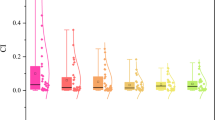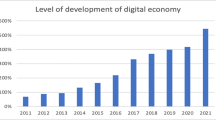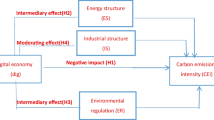Abstract
Improving carbon productivity is of great significance to China’s “30 · 60” carbon target, while the development of the digital economy is a driving force for green transformation. However, few studies discuss the relationship between the digital economy and carbon productivity. We investigate the influence of digital economic development on carbon productivity using panel data from 30 Chinese provinces from 2011 to 2020. Spatial econometric and moderating effects are considered. The results show that (i) digital economy has a positive direct and negative spatial spillover effect on carbon productivity, and this conclusion is still valid after the robustness test and endogeneity test; (ii) digital infrastructure has a greater impact on carbon productivity than digital industrialization and industrial digitalization; (iii) the mechanism analysis shows that environmental regulation negatively moderates the relationship between the digital economy and carbon productivity; (iv) heterogeneity analysis shows that the effect of the digital economy on carbon productivity is more obvious in the central region compared to the western region, while it is not significant in the eastern region. Overall, this paper not only provides a new analytical perspective for understanding the improvement of carbon productivity in the digital economy but also provides policy inspiration for promoting carbon peak and carbon neutrality goals.
Similar content being viewed by others
Data availability
Data will be made available on request.
References
Ali U, Guo Q, Nurgazina Z, Sharif A, Kartal MT, Kılıç Depren S, Khan A (2023) Heterogeneous impact of industrialization, foreign direct investments, and technological innovation on carbon emissions intensity: evidence from Kingdom of Saudi Arabia. Appl Energy 336:120804. https://doi.org/10.1016/j.apenergy.2023.120804
Appiah K, Worae TA, Yeboah B, Yeboah M (2022) The causal nexus between trade openness and environmental pollution in selected emerging economies. Ecol Indic 138:108872. https://doi.org/10.1016/j.ecolind.2022.108872
Barbera AJ, McConnell V (1990) The impact of environmental regulations on industry productivity: direct and indirect effects. J Environ Econ Manag 18(1):50–65
Bukht R, Heeks R (2017) Defining, conceptualising and measuring the digital economy. https://doi.org/10.2139/ssrn.3431732
Chang K, Liu L, Luo D, Xing K (2023a) The impact of green technology innovation on carbon dioxide emissions: the role of local environmental regulations. J Environ Manag 340:117990. https://doi.org/10.1016/j.jenvman.2023.117990
Chang Y, Tian Y, Li G, Pang J (2023b) Exploring the economic impacts of carbon tax in China using a dynamic computable general equilibrium model under a perspective of technological progress. J Clean Prod 386:135770. https://doi.org/10.1016/j.jclepro.2022.135770
Chen M, Wang K (2023) The combining and cooperative effects of carbon price and technological innovation on carbon emission reduction: evidence from China’s industrial enterprises. J Environ Manag 343:118188. https://doi.org/10.1016/j.jenvman.2023.118188
Chen W, Yao L (2024) The impact of digital economy on carbon total factor productivity: a spatial analysis of major urban agglomerations in China. J Environ Manag 351:119765. https://doi.org/10.1016/j.jenvman.2023.119765
Chen C, Ye F, Xiao H, Xie W, Liu B, Wang L (2023a) The digital economy, spatial spillovers and forestry green total factor productivity. J Clean Prod 405:136890. https://doi.org/10.1016/j.jclepro.2023.136890
Chen M, Jia W, Du C, Shi M, Henebry GM, Wang K (2023b) Carbon saving potential of urban parks due to heat mitigation in Yangtze River Economic Belt. J Clean Prod 385:135713. https://doi.org/10.1016/j.jclepro.2022.135713
Cheng J, Yi J, Dai S, Xiong Y (2019) Can low-carbon city construction facilitate green growth? Evidence from China’s pilot low-carbon city initiative. J Clean Prod 231:1158–1170. https://doi.org/10.1016/j.jclepro.2019.05.327
Dagestani AA, Shang Y, Schneider N, Cifuentes-Faura J, Zhao X (2023) Porter in China: a quasi-experimental view of market-based environmental regulation effects on firm performance. Energy Econ 126:106966. https://doi.org/10.1016/j.eneco.2023.106966
Davis J-M, Akese G, Garb Y (2019) Beyond the pollution haven hypothesis: where and why do e-waste hubs emerge and what does this mean for policies and interventions? Geoforum 98:36–45. https://doi.org/10.1016/j.geoforum.2018.09.020
Deng H, Bai G, Shen Z, Xia L (2022) Digital economy and its spatial effect on green productivity gains in manufacturing: evidence from China. J Clean Prod 378:134539. https://doi.org/10.1016/j.jclepro.2022.134539
Dong Z, He Y, Wang H, Wang L (2020) Is there a ripple effect in environmental regulation in China?–Evidence from the local-neighborhood green technology innovation perspective. Ecol Indic 118:106773. https://doi.org/10.1016/j.ecolind.2020.106773
Elhorst JP (2014) Spatial econometrics: from cross-sectional data to spatial panels. Springer, Berlin
Fang G, Tian L, Fu M, Sun M (2014) Government control or low carbon lifestyle?–Analysis and application of a novel selective-constrained energy-saving and emission-reduction dynamic evolution system. Energy Policy 68:498–507. https://doi.org/10.1016/j.enpol.2014.01.013
Fu J, Fu H, Zhu C, Sun Y, Cao H (2024) Assessing the health risk impacts of urban green spaces on air pollution-evidence from 31 China’s provinces. Ecol Indic 159:111725. https://doi.org/10.1016/j.ecolind.2024.111725
Guo R, Yuan Y (2020) Different types of environmental regulations and heterogeneous influence on energy efficiency in the industrial sector: evidence from Chinese provincial data. Energy Policy 145:111747. https://doi.org/10.1016/j.enpol.2020.111747
Guo Q, Ding C, Wu Z, Guo B, Xue Y, Li D (2022a) The impact of digital economy and industrial structure distortion on Xinjiang’s energy intensity under the goal of “double carbon.” Front Environ Sci 10:1036740. https://doi.org/10.3389/fenvs.2022.1036740
Guo Q, Wu Z, Jahanger A, Ding C, Guo B, Awan A (2022b) The spatial impact of digital economy on energy intensity in China in the context of double carbon to achieve the sustainable development goals. Environ Sci Pollut Res 30(13):35528–35544. https://doi.org/10.1007/s11356-022-24814-8
Han D, Ding Y, Shi Z, He Y (2022) The impact of digital economy on total factor carbon productivity: the threshold effect of technology accumulation. Environ Sci Pollut Res 29(37):55691–55706. https://doi.org/10.1007/s11356-022-19721-x
He Q, Wei F, Deng X, Kong F, Li C, Yan Z, Qi Y (2022) Spatiotemporal pattern of carbon productivity and carbon offset potential in Chinese counties. Sci Total Environ 846:157153. https://doi.org/10.1016/j.scitotenv.2022.157153
Hou S, Yu K, Fei R (2023) How does environmental regulation affect carbon productivity? The role of green technology progress and pollution transfer. J Environ Manag 345:118587. https://doi.org/10.1016/j.jenvman.2023.118587
Hu W, Wang D (2020) How does environmental regulation influence China’s carbon productivity? An empirical analysis based on the spatial spillover effect. J Clean Prod 257:120484. https://doi.org/10.1016/j.jclepro.2020.120484
Jiang H-D, Purohit P, Liang Q-M, Dong K, Liu L-J (2022) The cost-benefit comparisons of China’s and India’s NDCs based on carbon marginal abatement cost curves. Energy Econ 109:105946. https://doi.org/10.1016/j.eneco.2022.105946
Kaya Y, Yokobori K (eds) (1997) Environment, energy, and economy: strategies for sustainability. United Nations University Press, Tokyo New York
Koutroumpis P, Leiponen A, Thomas LDW (2020) Markets for data. Ind Corp. Change 29(3):645–660. https://doi.org/10.1093/icc/dtaa002
Li X, Shao X, Chang T, Albu LL (2022) Does digital finance promote the green innovation of China’s listed companies? Energy Econ 114:106254. https://doi.org/10.1016/j.eneco.2022.106254
Li X, Zheng Z, Shi D, Han X, Zhao M (2023) New urbanization and carbon emissions intensity reduction: mechanisms and spatial spillover effects. Sci Total Environ 905:167172. https://doi.org/10.1016/j.scitotenv.2023.167172
Lin B, Huang C (2023) How will promoting the digital economy affect electricity intensity? Energy Policy 173:113341. https://doi.org/10.1016/j.enpol.2022.113341
Lin B, Zhang A (2024) Impact of government subsidies on total factor productivity of energy storage enterprises under dual-carbon targets. Energy Policy 187:114046. https://doi.org/10.1016/j.enpol.2024.114046
Liu Y, Hao Y (2023) How does coordinated regional digital economy development improve air quality? New evidence from the spatial simultaneous equation analysis. J Environ Manag 342:118235. https://doi.org/10.1016/j.jenvman.2023.118235
Liu M, Li Y (2022) Environmental regulation and green innovation: evidence from China’s carbon emissions trading policy. Finance Res Lett 48:103051. https://doi.org/10.1016/j.frl.2022.103051
Liu X, Zhang X (2021) Industrial agglomeration, technological innovation and carbon productivity: evidence from China. Resour Conserv Recycl 166:105330. https://doi.org/10.1016/j.resconrec.2020.105330
Liu W, Zuo B, Qu C, Ge L, Shen Q (2022) A reasonable distribution of natural landscape: utilizing green space and water bodies to reduce residential building carbon emissions. Energy Build 267:112150. https://doi.org/10.1016/j.enbuild.2022.112150
Long R, Shao T, Chen H (2016) Spatial econometric analysis of China’s province-level industrial carbon productivity and its influencing factors. Appl Energy 166:210–219. https://doi.org/10.1016/j.apenergy.2015.09.100
Long Y, Liu L, Yang B (2023) Different types of environmental concerns and heterogeneous influence on green total factor productivity: evidence from Chinese provincial data. J Clean Prod 428:139295. https://doi.org/10.1016/j.jclepro.2023.139295
Lu X, Jiang X, Gong M (2020) How land transfer marketization influence on green total factor productivity from the approach of industrial structure? Evidence from China. Land Use Policy 95:104610. https://doi.org/10.1016/j.landusepol.2020.104610
Lu Y, Chen L, Meng Y (2023) How does science and technology innovation improve carbon productivity?—Evidence at China’s province level. Environ Sci Pollut Res 30(45):101296–101316. https://doi.org/10.1007/s11356-023-29437-1
Luo K, Liu Y, Chen P-F, Zeng M (2022) Assessing the impact of digital economy on green development efficiency in the Yangtze River Economic Belt. Energy Econ 112:106127. https://doi.org/10.1016/j.eneco.2022.106127
Lyu Y, Wang W, Wu Y, Zhang J (2023) How does digital economy affect green total factor productivity? Evidence from China. Sci Total Environ 857:159428. https://doi.org/10.1016/j.scitotenv.2022.159428
Lyu Y, Xiao X, Zhang J (2024) Does the digital economy enhance green total factor productivity in China? The evidence from a national big data comprehensive pilot zone. Struct Chang Econ Dyn 69:183–196. https://doi.org/10.1016/j.strueco.2023.12.009
Pan X, Ai B, Li C, Pan X, Yan Y (2019) Dynamic relationship among environmental regulation, technological innovation and energy efficiency based on large scale provincial panel data in China. Technol Forecast Soc Chang 144:428–435. https://doi.org/10.1016/j.techfore.2017.12.012
Pan W, Xie T, Wang Z, Ma L (2022) Digital economy: an innovation driver for total factor productivity. J Bus Res 139:303–311. https://doi.org/10.1016/j.jbusres.2021.09.061
Ran Q, Yang X, Yan H, Xu Y, Cao J (2023) Natural resource consumption and industrial green transformation: does the digital economy matter? Resour Policy 81:103396. https://doi.org/10.1016/j.resourpol.2023.103396
Ren S, Li X, Yuan B, Li D, Chen X (2018) The effects of three types of environmental regulation on eco-efficiency: a cross-region analysis in China. J Clean Prod 173:245–255. https://doi.org/10.1016/j.jclepro.2016.08.113
Spiekermann M (2019) Data marketplaces: trends and monetisation of data goods. Intereconomics Rev Eur Econ Policy 54(4):208–216
Sun H, Chen T, Wang CN (2023) Spatial impact of digital finance on carbon productivity. Geosci Front 101674. https://doi.org/10.1016/j.gsf.2023.101674
Tang K, Yang G (2023) Does digital infrastructure cut carbon emissions in Chinese cities? Sustain Prod Consum 35:431–443. https://doi.org/10.1016/j.spc.2022.11.022
Tapscott D (1996) The digital economy: promise and peril in the age of networked intelligence. McGraw-Hill, New York, Montreal
Tariq A, Hassan A (2023) Role of green finance, environmental regulations, and economic development in the transition towards a sustainable environment. J Clean Prod 413:137425. https://doi.org/10.1016/j.jclepro.2023.137425
Tian Y, Feng C (2022) The internal-structural effects of different types of environmental regulations on China’s green total-factor productivity. Energy Econ 113:106246. https://doi.org/10.1016/j.eneco.2022.106246
Wan Q, Shi D (2022) Smarter and cleaner: the digital economy and environmental pollution. China World Econ 30(6):59–85. https://doi.org/10.1111/cwe.12446
Wang K-L, Pang S-Q, Zhang F-Q, Miao Z, Sun H-P (2022) The impact assessment of smart city policy on urban green total-factor productivity: evidence from China. Environ Impact Assess Rev 94:106756. https://doi.org/10.1016/j.eiar.2022.106756
Wang J, Liu Y, Wang W, Wu H (2023a) How does digital transformation drive green total factor productivity? Evidence from Chinese listed enterprises. J Clean Prod 406:136954. https://doi.org/10.1016/j.jclepro.2023.136954
Wang S, Zhang R, Yang Y, Chen J, Yang S (2023b) Has enterprise digital transformation facilitated the carbon performance in Industry 4.0 era? Evidence from Chinese industrial enterprises. Comput Ind Eng 184:109576. https://doi.org/10.1016/j.cie.2023.109576
Wang Y, Wang Y, Shahbaz M (2023c) How does digital economy affect energy poverty? Analysis from the global perspective. Energy 128692. https://doi.org/10.1016/j.energy.2023.128692
Weng Z, Ma Z, Xie Y, Cheng C (2022) Effect of China’s carbon market on the promotion of green technological innovation. J Clean Prod 373:133820. https://doi.org/10.1016/j.jclepro.2022.133820
Xia L, Gao S, Wei J, Ding Q (2022) Government subsidy and corporate green innovation-does board governance play a role? Energy Policy 161:112720. https://doi.org/10.1016/j.enpol.2021.112720
Xin Y, Song H, Shen Z, Wang J (2023) Measurement of the integration level between the digital economy and industry and its impact on energy consumption. Energy Econ 126:106988. https://doi.org/10.1016/j.eneco.2023.106988
Yan B, Xia Y, Jiang X (2023) Carbon productivity and value-added generations: regional heterogeneity along global value chain. Struct Chang Econ Dyn 65:111–125. https://doi.org/10.1016/j.strueco.2023.02.009
Yang J, Jin M, Chen Y (2023) Has the synergistic development of urban cluster improved carbon productivity?–Empirical evidence from China. J Clean Prod 414:137535. https://doi.org/10.1016/j.jclepro.2023.137535
Yi M, Liu Y, Sheng MS, Wen L (2022) Effects of digital economy on carbon emission reduction: new evidence from China. Energy Policy 171:113271. https://doi.org/10.1016/j.enpol.2022.113271
Zeng S, Gu J (2023) Coordination evaluation and dynamic adjustment mechanism of China’s green development at inter-provincial level. Ecol Indic 153:110419. https://doi.org/10.1016/j.ecolind.2023.110419
Zhang L, Xiong L, Cheng B, Yu C (2018) How does foreign trade influence China’s carbon productivity? Based on panel spatial lag model analysis. Struct Chang Econ Dyn 47:171–179. https://doi.org/10.1016/j.strueco.2018.08.008
Zhang J, Kang L, Li H, Ballesteros-Pérez P, Skitmore M, Zuo J (2020) The impact of environmental regulations on urban Green innovation efficiency: the case of Xi’an. Sustain Cities Soc 57:102123. https://doi.org/10.1016/j.scs.2020.102123
Zhang W, Liu X, Wang D, Zhou J (2022) Digital economy and carbon emission performance: evidence at China’s city level. Energy Policy 165:112927. https://doi.org/10.1016/j.enpol.2022.112927
Zhang F, Yang B, Zhu L (2023a) Digital technology usage, strategic flexibility, and business model innovation in traditional manufacturing firms: the moderating role of the institutional environment. Technol Forecast Soc Chang 194:122726. https://doi.org/10.1016/j.techfore.2023.122726
Zhang X, Huang S, Li W, Wang Y (2023b) Directors’ and officers’ liability insurance, environmental regulation and firms’ environmental responsibility. Ecol Econ 208:107796. https://doi.org/10.1016/j.ecolecon.2023.107796
Zhang X, Yao S, Zheng W, Fang J (2023c) On industrial agglomeration and industrial carbon productivity–-impact mechanism and nonlinear relationship. Energy 283:129047. https://doi.org/10.1016/j.energy.2023.129047
Zhang L, Cai C, Singh K, Zhong K (2024) Green technology innovation, trade deficit and carbon emission transfer in agriculture under the new “dual circulation” development pattern of China. Ecol Indic 159:111757. https://doi.org/10.1016/j.ecolind.2024.111757
Zhao S, Teng L, Arkorful VE, Hu H (2023) Impacts of digital government on regional eco-innovation: moderating role of dual environmental regulations. Technol Forecast Soc Chang 196:122842. https://doi.org/10.1016/j.techfore.2023.122842
Zhou X, Ji J (2023) The nonlinear effects of digital economy on the low-carbon green total factor productivity: evidence from China. Environ Sci Pollut Res 30(39):91396–91414. https://doi.org/10.1007/s11356-023-28828-8
Zhou L, Tang L (2021) Environmental regulation and the growth of the total-factor carbon productivity of China’s industries: evidence from the implementation of action plan of air pollution prevention and control. J Environ Manag 296:113078. https://doi.org/10.1016/j.jenvman.2021.113078
Author information
Authors and Affiliations
Contributions
Jianrui Zhu: writing—original draft preparation, writing—reviewing and editing, methodology, software, validation, data curation.
Xueqin Li: writing—reviewing and editing, visualization, investigation.
Daqian Shi (corresponding author): idea, conceptualization, supervision.
Corresponding author
Ethics declarations
Ethical approval
All work in this research was completed by the authors, and all procedures were performed in accordance with ethical standards.
Consent to participate
We affirm that all authors participated in the research and are fully aware of their ethical responsibilities.
Consent for publication
We affirm that all authors have agreed to submit the paper to ESPR and are fully aware of the ethical responsibilities.
Competing interests
The authors declare no competing interests.
Additional information
Responsible Editor: Eyup Dogan
Publisher's Note
Springer Nature remains neutral with regard to jurisdictional claims in published maps and institutional affiliations.
Rights and permissions
Springer Nature or its licensor (e.g. a society or other partner) holds exclusive rights to this article under a publishing agreement with the author(s) or other rightsholder(s); author self-archiving of the accepted manuscript version of this article is solely governed by the terms of such publishing agreement and applicable law.
About this article
Cite this article
Zhu, J., Li, X. & Shi, D. How does the development of the digital economy influence carbon productivity? The moderating effect of environmental regulation. Environ Sci Pollut Res 31, 31896–31910 (2024). https://doi.org/10.1007/s11356-024-33382-y
Received:
Accepted:
Published:
Issue Date:
DOI: https://doi.org/10.1007/s11356-024-33382-y




